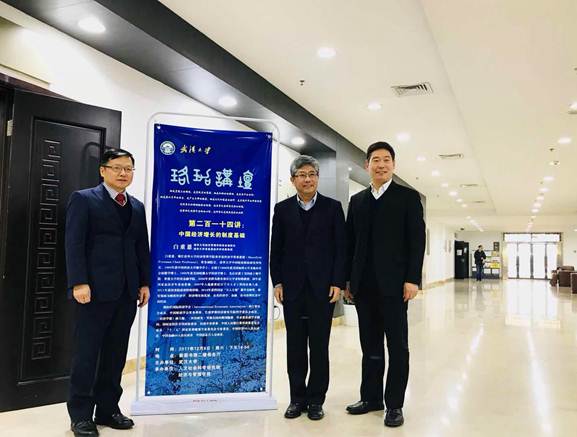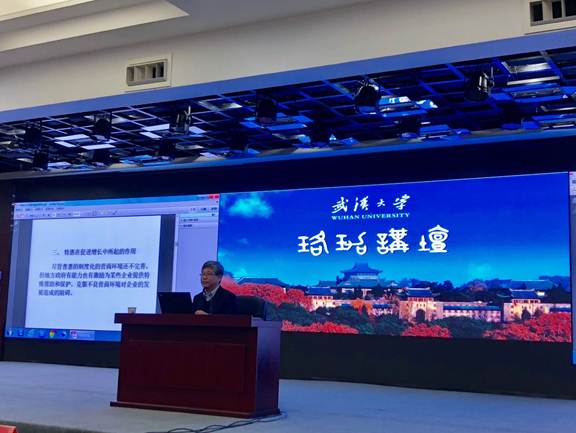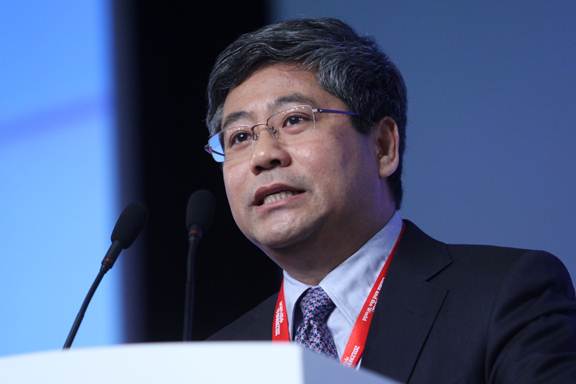At the 214th Luojia Lecture held in the main library on Dec. 9th, Mansfield Freeman Chair Professor, and executive associate dean of the School of Economics and Management of Tsinghua University, Prof. Bai Chong-En gave a speech entitled “From preferential treatment to inclusive development—the institutional fundament of China’s economic growth”. The lecture was hosted by the Dean of the School of Economics and Management, Prof. Song Min.

Prof. Bai (middle) with Prof. Shen Zhuanghai (right) and Prof. Song (left)
Prof. Bai started his speech with an introduction to a basic economic concept, the Walrasian equilibrium, which appropriately applies to the analysis of commodity markets with flexible prices and many traders. According to this hypothesis, the competitive market is an ideal standard by which other market structures are evaluated. This elicited the following questions: Why is the market economy of crucial importance? How has China been able to make relatively fast development in such an imperfect institutional condition?
Prof. Bai’s explanation is that despite the imperfections, regional government is always capable of helping particular enterprises overcome difficulties in establishing and running a business. The motivation for the government to do this is to obtain their benefits, which includes achievability, political capital, tax revenue, etc. Prof. Bai named this kind of pattern preferential treatment. Therefore, the resource-limited local government is impuissant of helping every enterprise, so they would only be willingly to support those who can maximum their benefits. Macroscopically, this preferential treatment contributed to the past high-speed growth, but would make future development unsustainable.
In order to examine his hypothesis, Prof. Bai established a quantitative model and made some assumptions to simplify the condition. In his model, the stimulation of helping those “particular enterprises” is to obtain benefits from this preferential treatment, the factor “benefit” is constituted by achievability, promotion and taxation. Since the resources and capability of a local government are limited, it cannot help every agent in the market. So Prof. Bai’s formula shows that the government would only treat agent preferentially when the benefit exceeds the cost, in other words, the risks of helping them out. Meanwhile, Prof. Bai pointed out that it’s important to have many regions, since the entrant can go to other regions where there are no competing incumbents who have received preferential treatment.

Prof. Bai at the lecture
The preferential treatment may promote local economic growth. Whereas, its inequity and side effects are conspicuous. Firstly, this method lowers the efficiency of resource distribution due to the crowding-out effect, and the process of selecting and obtaining excellent enterprises is getting harder and harder, consequently the performance of preferential treatment is becoming worse. All these disadvantages can reflect its unsustainability. Secondly, this pattern caused regional protectionism. Prof. Bai and his team found that industries with a higher portion of state-owned companies and higher interest rate enjoyed a better environment from protectionism. Next, this mode is harmful to consumer rights, as residential land price exceeded the industrial estate price. In addition, preferential treatment can also bring about corruption, intellectual property disputes, resistance to reform and other problems.
Prof. Bai believed that an inclusive development is the solution to the above questions. He illustrated that according to the World Bank Doing Business Index, which consists of 10 factors (including register permission, construction permit, and investor protection), China ranks 78th among 190 countries. This is barely satisfactory in terms of a business environment. Therefore, a decentralization of authority and simplification of procedures are in desperate demand.
The good news is that the Chinese government was aware of the necessity and started reforms earlier. The State Council has published several notices and orders to correct the former distorted institution. Now the tax preferential treatment policy is strictly forbidden by the central government.

Prof. Bai Chong-En
As for the information about Professor Bai Chong-En, he earned his PhD degrees in Mathematics and Economics from UCSD and Harvard University respectively. His research areas include institutional economics, economic growth and development, public economics, finance, corporate governance and the Chinese economy.
And he has made great academic achievements and won numerous awards in the economic field. His research on the impact of the institutional environment on the development of the service sector won the Inaugural Pu Shan-Bank of China’s best paper award given by the Chinese Society of World Economics in 2008. His research on the return of investment won the Sun Yefang Best Economics Paper Award in 2009. His study on the model of national income distribution and its reform was funded by the National Planning Office of Philosophy and Social Sciences Major Grant. His research on the national income distribution won the Zhang Pei-Gang Award for Outstanding Achievements in Development Economics in 2012. His study on the challenges of and the measures for the development of the service sector in China won the Second Prize for Excellent Research in Humanities and Social Sciences in the category of research report in economics, and was awarded by the Ministry of Education of China. His study on the relation between health insurance and consumption won the Second Prize for Excellent Research in Humanities and Social Sciences in the category of research paper, and was awarded by the Ministry of Education of China.
Edited by: Wang Wei, Edmund Wai Man Lai & Hu Sijia
Photo by: School of Humanities and Social Sciences